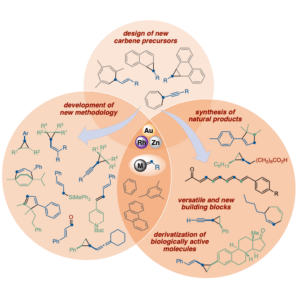 22/07/2021
22/07/2021
 11:00
11:00
 ZOOM Platform
ZOOM Platform
- Lecturer: Mauro Mato Gómez
- Supervisors: Prof. Antonio M. Echavarren
Streamlining the Access to Metal Carbenes through Aromative Decarbenations
Modern synthetic organic chemistry relies significantly in metal catalysis, a discipline that often involves the study of reactive organometallic intermediates. One of the fundamental intermediates in organometallic chemistry are metal carbenes. Metal carbenes display very unique reactivity patterns, which makes them invaluable for the construction of certain structures, such as cyclopropanes. Due to the limitations presented by most of the stablished metal-carbene precursors, we propose the use of alternative carbene sources based on the concept of aromative decarbenation, or retro-Buchner reaction.
In the presence of cationic gold(I) complexes, 7-subtituted cycloheptatrienes can undergo a decarbenation or retro-Buchner reaction, generating gold(I) carbenes upon release of a molecule of benzene. We have extended this concept for the development of new and more reactive carbene precursors, based on the release of different aromatic or polyaromatic molecules and through catalysis of metals other than gold. Thus, through the gold(I)-, rhodium(II)- and zinc(II)-catalyzed decarbenation of cycloheptatrienes (and related substrates), we developed new and improved cyclopropanation protocols, which allowed the assembly of more than 150 di- to pentasubstituted cyclopropanes.
We also found that, besides cyclopropanations, these types of carbene intermediates can take part in processes such as higher cycloadditions, insertions, oxidations and cascade ring-opening reactions. This allowed the preparation of a library of cyclopentadienes, 1,4-cycloheptadienes, allylsilanes, aldehydes, cyclopropyl ethers and polyenes, among other structures. We studied the mechanism of some of the new transformations by combination of experiments and DFT calculations. Finally, we illustrated the potential of the new methodologies through the total synthesis of different natural products (lactobacillic acid, laurokamurene B, dictyopterene C′ and navenones B–C) and other relevant compounds, such as versatile synthetic intermediates or derivatives of drug-like molecules (prepared through late-stage functionalization).
If you would like to attend this PhD thesis defense, please, register here!
Other events

Let's create a brighter future
Join our team to work with renowned researchers, tackle groundbreaking
projects and contribute to meaningful scientific advancements




















